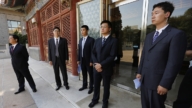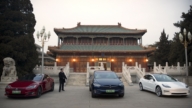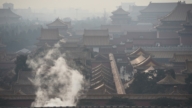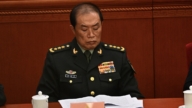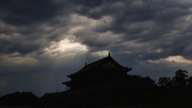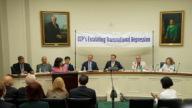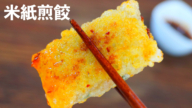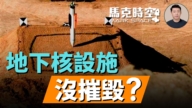【新唐人2013年05月04日讯】有香港杂志透露,中共当局近期新设置了五大核心决策工作领导小组。其中,在“十八大”上被挤出常委的李源潮兼任多职,扮演重要角色,而有江泽民背景的刘云山,俞正声和张高丽都没有份。外界认为,中共新总书记习近平设置5大决策组,是为了绕开江泽民在“十八大”时塞进的常委势力,而在具体做事中“架空江系”。
5月号的香港《开放》杂志透露,3月18号,在中共中央政治局第十九次会议上,宣布了“重大政策领导小组”,和“非常时期领导小组”、“外交反恐安全领导小组”、“经济工作领导小组”,以及“军事领导小组”成员,及成员的职能和职责。
5大核心班子中,中共国家主席习近平担任4个小组组长,总理李克强担任经济领导小组组长及4个小组副组长,新任国家副主席李源潮担任了其中4个班子的副组长,和3个组的办公室主任。
时政评论家 蓝述:“这次李源潮在5个中央领导小组,担任其中4个领导小组的副组长,基本可以看出来,江系在政治局里面的这些势力,基本上没有被安排进中共最高的具体掌控事务的,在政治局常委之上的,处理具体事务方面,它的这个实权被架空了。俞正声和刘云山在5个领导小组都没有出现。”
时政评论家蓝述还指出,在“十八大”时入常的张高丽,张德江,俞正声、刘云山都是江系人马,这5个领导小组中,连中共的笔杆子刘云山都没能进去,说明江泽民在现有的中共班子中,影响极其微小。
李源潮曾经跟习近平搭档多年,而且都是直接配合习近平的工作。习近平担任中央党校校长的时候,李源潮是中央党校副校长,习近平在中共中央书记处主持工作的时候,李源潮是中共中央组织部的部长。
纽约城市大学政治学教授 夏明:“在习近平作为国家主席和总书记,还有中央军委三个职位同时兼以后,习近平基本上是把职位权力往国家主席这方面靠,他周围几个重要人物都是重量级的,他们的职位基本都是党内的政治局委员,可他们行使非常大权力,地位也非常高,在辅佐习近平。 ”
据香港《大公网》报导,目前中共“中办”、“国办”主力大调整,换上了习、李人马。另外5月2号,在前任中华全国总工会主席倪志福火化的葬礼中,江泽民和胡锦涛排在现任的7常委之后。
北京时政观察人士华颇表示,“十六大”时,江泽民在胡、温班底中,大肆安插自己的人马,最终导致地方权力做大,中央显得薄弱,这次换届中,胡锦涛的“裸退”给习近平帮了大忙。
不过华颇指出,习、李上台后所面临的局面非常危险,人民的忍耐力已经到了极限,民众对他们已经极度不信任。华颇说,汶川地震时胡、温还可以做秀,这次卢山地震就截然不同,给中共表演的空间非常小。
华颇认为,由于习、李不愿放弃共产党,目前为了压制民怨,走上了左派的做法。
华颇:“我觉得习、李呀,看中的是左派的一些做法,文革的一些做法。起码呢,他觉得这些做法能够立竿见影,但是我觉得这些也很难,比如说这个领导干部财产公开,而且还有这个退休后养老制度的双轨制,我想遇到这些关键问题能不能落实﹖关键还得看习、李的整党结果吧﹗”
华颇还表示,习近平上台后,为了收揽民心,采取了一系列措施,但来自利益集团和地方政府的阻力非常大。
采访编辑/刘惠 后制/李若琳
Five Central Groups Overriding Politburo Standing Committee
Hong Kong’s media have disclosed that the Chinese
Communist Party (CCP) authorities have recently
set up five central decision-making groups.
Li Yuanchao, squeezed out of the Politburo
Standing Committee at the 18th CCP Congress,
has now filled crucial positions
in these newly established groups.
Liu Yunshan, Yu Zhengsheng and Zhang Gaoli, members
of the Jiang faction are all inaccessible to the groups.
Political observers say that Xi Jinping has used the
five central groups to bypass Jiang’s politburo associates,
and to deprive Jiang’s faction of any authority.
According to the May issue of Hong Kong’s Open magazine,
the CCP politburo held the 19th session on March 18.
It declared that it had set up five core steering groups.
The central groups and their members will
take charge in major policy,
diplomacy and counter-terrorism security,
economy, military, and leadership in unusual times.
CCP leader Xi Jinping heads four of the five groups.
CCP premier Li Keqiang chairs the economic leading group
and acts as Xi’s deputy in the other four groups.
Li Yuanchao, the new vice president, holds posts of deputy
in four groups and acts as office director in three groups.
(Critic) Lan Shu: “Li Yuanchao takes four vice seats
in four central steering groups.
That indicates that Jiang’s politburo associates
have been deprived of their real power.
Neither Yu Zhengsheng or Liu Yunshan have
taken any seat in these groups.”
Lan Shu says that several newly selected
politburo members are all Jiang’s followers.
They include Zhang Gaoli, Zhang Dejiang,
Yu Zhengsheng and Liu Yunshan.
Even Liu Yunshan, CCP propaganda czar,
couldn’t get into the five central leading groups.
This shows that Jiang’s faction has very little
influence on the incumbent CCP core leadership.
Li Yuanchao is a long-term work partner of Xi Jinping.
When Xi was the president of CCP Central Party School,
Li acted as his deputy.
During Xi’s tenure as Secretary of the CCP Central Committee,
Li was head of the CCP Organization Department.
(Professor, the City University of New York) Xia Ming:
“Since Xi assumed the office of state president,
CCP general secretary and Central Military Commission chief,
he has leaned to play the role of state president.
Around Xi are several heavyweights who are
all politburo members.
As high-ranking officials, they hold real power and assist Xi.”
Hong Kong’s Takungpao reported on the management
reshuffle in the General Offices of the Central Committee and of the State Council.
Associates of Xi Jinping and Li Yuanchao reportedly
took over executive positions.
On May 2, At the funeral for the cremation of Ni Zhifu,
former Chairman of the All-China Federation of Trade Unions,
Jiang Zemin and Hu Jintao were listed after
the top-seven Politburo leaders.
Beijing Politics observer, Hua Po, comments.
At the 16th CCP Congress, Jiang Zemin placed many of his
underlings in the cabinet of Hu Jintao and Wen Jiabao.
That gave rise to a power expansion of CCP local authorities,
whilst it weakened the CCP’s central authority.
Hua Po says that Hu Jintao’s complete retirement
from all posts has helped Xi a lot.
Hua Po adds that the situation facing Xi and Li
is indeed daunting.
The masses’ tolerance has reached its limit,
along with their thorough distrust of these two.
Hua Po remarks that in dealing with the Wenchuan earthquake,
Hu Jintao and Wen Jiabao could still make a show.
Yet for the recent Lushan quake, there is no room
left for the CCP to perform, he says.
Xi and Li are reluctant to give up the CCP, Hua Po remarks.
In order to hold down the swell of popular grievances,
they have to take a leftist approach.
Hua Po: “In my view, Xi and Li have adopted leftist practices,
which were used in the Cultural Revolution.
They might think that these techniques, at least, can
produce instant results, but I think it unlikely they will work.
Can they really put into effect those key issues, such as
implementing the declaration of all assets owned by public officials,
and the rolling out of a dual pension system?
I think that depends on the final outcome of
Xi-Li’s planned ideological rectification of the Party.”
Hua Po indicates that, since taking office,
Xi Jinping has initiated a series of measures, to try and gain popular support.
However, he has still met with heavy resistance
from CCP privileged groups and local authorities.


